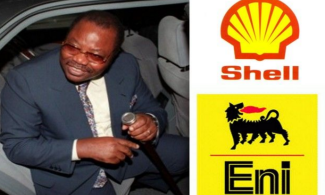
The Italian oil company is currently being investigated by Italian, Dutch, and Nigerian authorities for secretly paying $1.1b to Malabu Oil & Gas in 2011 to acquire OPL 245, one of the largest and richest oil blocs in Africa.
Eni executives have been accused of misleading investors and shareholders regarding the company’s involvement in the $1.1b Malabu oil scandal, Global Witness has reported.
The Italian oil company is currently being investigated by Italian, Dutch, and Nigerian authorities for secretly paying $1.1b to Malabu Oil & Gas in 2011 to acquire OPL 245, one of the largest and richest oil blocs in Africa.
Eni conducted its own internal investigation into the matter and claimed that it “did not find evidence of illegal conduct.”
However, when investors and shareholders asked Eni executives about the scandal at yesterday’s Annual General Meetings, executives admitted that they did not interview key suspects linked to the oil deal. Furthermore, the Milan Public Prosecutor found that the investigation was “inconclusive and of poor value.”

“Eni’s investigation failed to interview key people inside and outside the company who negotiated the corrupt deal, and failed to access key documentation that forms the basis of the allegations against the company,” said Barnaby Pace, a campaigner for Global Witness.
“Eni has to come clean over this corrupt deal, the company told its investors it had found no evidence of illegal conduct but given what we now know about their investigation this isn’t good enough.
Investors should be seriously worried about the systemic risks that the company might be facing if this is how they react to serious corruption allegations,” he added.
OPL 245 was initially awarded to Malabu Oil & Gas for $20 million in 1998 by petroleum minister Dan Etete, who served under the Sani Abacha administration and secretly owned Malabu.
The bloc was then sold to Shell and Eni in 2011 for $1.1 billion, with the Nigerian government acting as a conduit. It was later revealed that this sum secretly transferred to Malabu accounts owned by Mr. Etete. Diezani Alison-Madueke,the petroleum minister at the time, presided over the deal, but she has evaded investigations conducted by the Economic and Financial Crimes Commission (EFCC) and other authorities.
Eni and Shell denied knowledge that this money went to Mr. Etete, but evidence has revealed that they were “intimately involved” in the deal.
When Eni investors and shareholders aware of the scandal inquired the company about the allegations, Eni management said, “ Obviously these interviews…did not regard those known to be listed in the register of suspects at the Milan prosecutor’s office, in order not to interfere with the judiciary’s investigations. Being an independent internal audit on a voluntary basis, it was not necessary to refer to the rule of the Code of Criminal Procedure governing defense investigations.”
The investigation of Eni, Shell, Mr. Etete, and others linked to the scandal is still ongoing. In February 2016, Dutch authorities raided Shell’s office in The Hague, while the EFCC has frozen $190 million paid by Shell and Eni to Mr. Etete.
While Eni has conducted its own internal investigations and has “self-reported” to U.S. authorities, Shell has denied any wrongdoing.